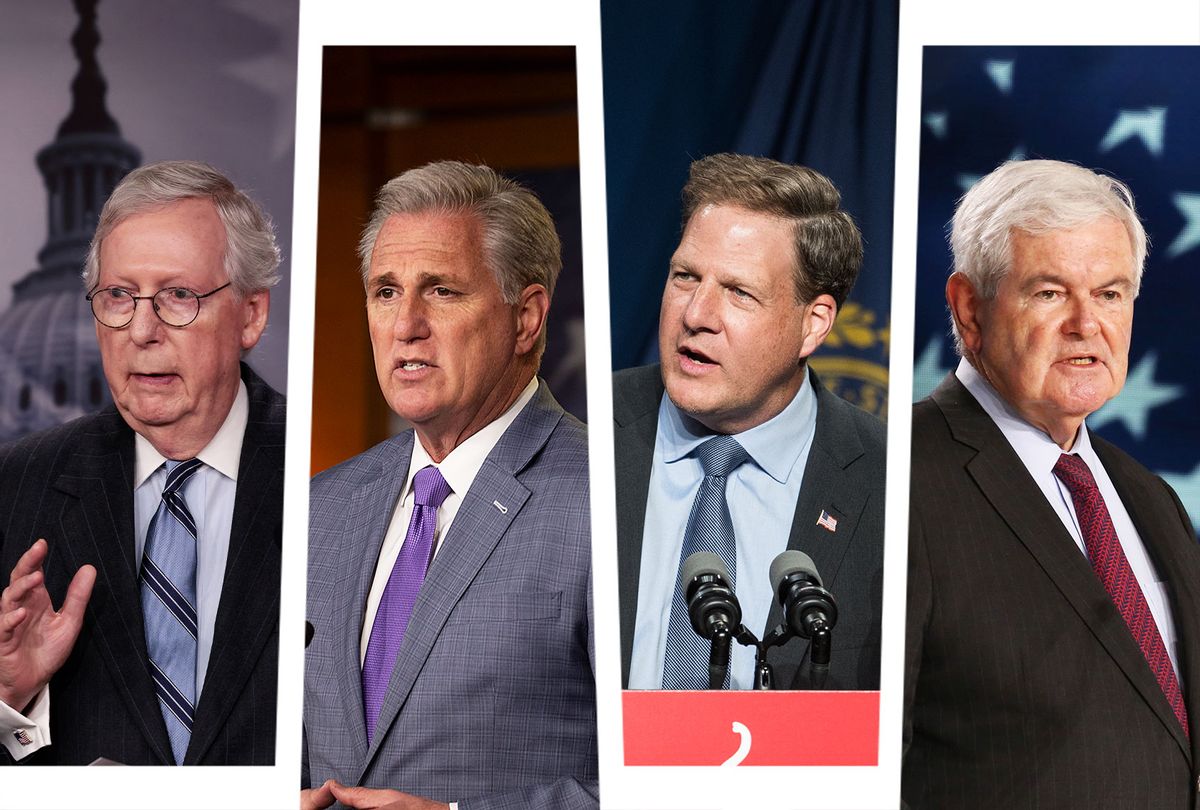New Hampshire Gov. Chris Sununu, who recently bowed out of a much-anticipated U.S. Senate bid, revealed that he was "bothered" after conversations with dozens of Republican Senators, who apparently wanted him to be a "roadblock" until the GOP retakes the White House. Sununu told The Washington Examiner this month that he was initially "pretty close" to running, explaining: "I wasn't ready to make an announcement, but I was like, 'OK, this makes sense. I think I could be a voice nationally.'" But after chatting with "most" of the GOP Senate caucus, Sununu reportedly soured on the role once it became apparent that they wanted him to be a legislative mule.
"They were all, for the most part, content with the speed at which they weren't doing anything. It was very clear that we just have to hold the line for two years," he told the Examiner. "OK, so I'm just going to be a roadblock for two years. That's not what I do."
"It bothered me that they were OK with that," the governor added.
Sununu's comments come in the wake of an intense legislative standoff between Democrats and Republicans over voting rights, an issue which became the focus of President Biden's agenda after negotiations on the "Build Back Better Act" – the president's $2.2 trillion social safety net plan – fell apart.
RELATED: Joe Manchin's revisionist history: Filibuster stands after Senate Democrat sides with Republicans
On Wednesday, Senate Republicans successfully filibustered Biden's sweeping voting rights overhaul – known as the "Freedom to Vote: John R. Lewis Act" – which would standardize voting laws across all 50 states and clamp down on voter suppression. Not a single Republican backed the measure, even though the bill is supported by nearly 70% of Americans, according to a Navigator poll from November.
With Republicans having dashed Biden's hopes of passing the party's two signature pieces of legislation – the "Build Back Better Act" and the "Freedom to Vote: John R. Lewis Act" – Democrats now question whether their colleagues believe in anything other than mindless obstructionism.
During a press conference on Wednesday, Biden echoed the spirit of Sununu's remarks, asking reporters, "What are Republicans for? What are they for? Name me one thing they're for."
That same day, Senate Minority Leader Mitch McConnell, R-Ky., sidestepped questioning when asked to lay out GOP's official agenda. "That's a very good question," McConnell said. "And I'll let you know when we take it back."
According to a recent Axios report, the Kentucky Republican has privately told colleagues and donors that the Republicans have no legislative agenda and are more interested in picking apart Democrats'.
Meanwhile, the House GOP caucus appears to be adopting the opposite strategy, according to The Washington Post, with its leadership drumming up a "list of policy pledges" designed to buoy support for the party in 2022.
Among those helming this effort are House Speaker Kevin McCarthy, R-Calif., and House Whip Steve Scalise, R-La., both of whom ardently supported Donald Trump's election fraud conspiracy and voted to overturn the 2020 election.
RELATED: The right "isn't fully sold" on Kevin McCarthy's leadership, even if Republicans win the House
Playing an advisory role to McCarthy is former Republican House Speaker Newt Gingrich, who crafted the "Contract with America," a legislative platform widely linked to the GOP's successful campaign to flip both chambers in 1994.
Gingrich told the Post that McCarthy doesn't believe an anti-Biden agenda is sufficient for 2022, saying, "We need a positive message."
"I think that's clearly what McCarthy wants to do and I've offered to look at stuff and offer advice," Gingrich added. "There's lots of people in the House working on it. It will be a widespread commitment."
While the exact details of McCarthy's agenda remain hazy, the broad contours of the plan are clear.
So-called "parental rights" are expected to be front and center as Republican state officials continue to decry the alleged instruction of "critical race theory" – whose prevalence appears to be vastly overstated. For remedy, McCarthy has already released an informal "Parents Bill of Rights," which includes such provisions as the "right to be heard" and the "right to know what's being taught in schools and see reading material."
RELATED: Parental rights" started on the Christian fringe — now it's the GOP's winning issue
The House Speaker is also expected to assemble seven "issue-specific task forces" that will tackle a variety of other policy objectives, such as countering China's economic prowess, combating the recent crime wave, securing the nation's borders, regulating Big Tech, cutting corporate taxes, bulldozing environmental regulations, and curtailing inflation.
Want a daily wrap-up of all the news and commentary Salon has to offer? Subscribe to our morning newsletter, Crash Course.
The soaring cost of consumer goods has proven an evergreen source of whataboutism for Republicans, even as the year-end jobs numbers indicate that Biden has steered the economy through an unprecedented economic recovery since he took office. Fox News called inflation a "top weapon" for the GOP to wield against Democrats in the upcoming midterms.
Throughout 2021, the consumer prices index rose 6.8% – the highest increase it has seen since 1982.
RELATED: Behind Biden's booming economy
But when it comes to actually tackling inflation, lawmakers have historically had to walk a tightrope, said Brian Riedl, who served as an aide to Sen. Rob Portman, R-Ohio.
"There is nothing that messages well, significantly reduces inflation and is painless," Riedl told the Post. "It's easier to criticize inflation than to map out an actual solution going forward, and that's the box Republicans are currently in."

Shares